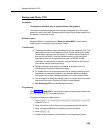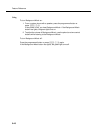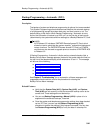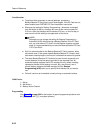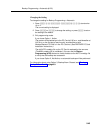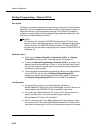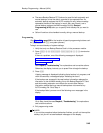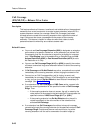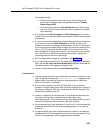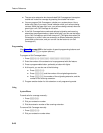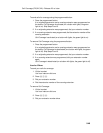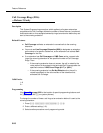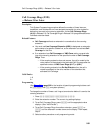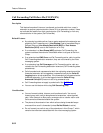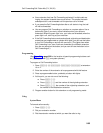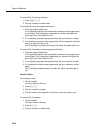
Call Coverage (F20,XX,XX)—Release 2.0 or Later
5-47
For transferred calls:
— If the covering extension does not answer, the call goes to the
transfer return extension after the specified number of Transfer
Return Rings (#105).
— If the covering extension has Do Not Disturb active, the call rings
one more time at the user’s extension before it goes to the transfer
return extension.
■ If an extension has Call Coverage and Call Forwarding active, calls are
routed to the Call Forwarding destination extension (Call Forwarding takes
precedence).
■ If a user at a covering extension has a system display phone and is busy on
a call, he or she can use Caller ID Inspect to view the number of the
extension from which a coverage call is being sent. If a user is not active on
a call and multiple coverage calls are ringing, he or she can press the line,
pool, or
i buttons to view the number of the extension from which
each coverage call is being sent; however, if the user picks up the handset,
he or she will join or answer the call that was previously ringing at the
originating extension shown on the display.
■ Call Coverage does not apply to parked calls. See Call Park.
■ If you want calls answered by Call Coverage to be logged as unanswered
calls, use the Call Log Line Associations (#318) feature to associate the
lines with extensions for logging unanswered calls.
■ You can use this feature while using Call Screening (F25).
Considerations
■ A system display phone is recommended for the covering extension so the
user can identify coverage calls.
Coverage Call for XX
appears on the
display when a coverage call rings at a covering extension rather than
Caller ID information, if available.
■ If the covering extension has an Auto Dial button for the originating
extension, the light shows green flutter while the coverage call is ringing at
the covering extension. If the user at the extension lifts the handset, he or
she will be connected to this call.
■ Intercom, transferred, and outside calls on lines assigned ownership can
be covered. Group calls, forwarded calls, transfer-return calls,
voice-signaled calls, Voice Interrupt on Busy calls, Wake-Up Service calls,
and calls to doorphone alert extensions cannot be covered.
■ Do not designate any of the extensions in Hunt Group 7, which contains the
extensions associated with the voice messaging system, as a covering
extension.
■ A single extension can cover multiple extensions; however, an extension
programmed for Call Coverage can have only one covering extension. Only
one Call Coverage button can be programmed per extension.



